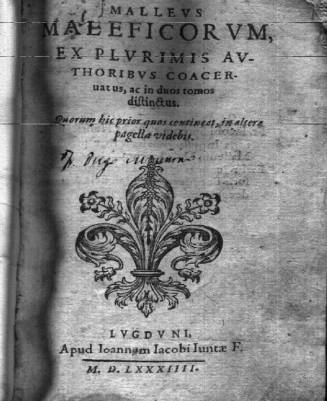1484 1508

The book was reprinted 13 times over forty years and helped to define witchcraft for all.

The contents of the book described women as the main participants of demon worship because of their "manifold weaknesses" making them weaker in the faith and more carnal then men. This has been an idea that has lasted for a long time. What do you think of when someone says witch? A woman.
 The book "On the Demon Mania of Sorcerers" was written in response to a man accused of witchcraft claiming that France contained over 100,000 more devil followers. This caused major panic. A book had to be written and printed so that people would know what these satanists looked like and how they were to be dealt with. Here are some of the chapter headings:
The book "On the Demon Mania of Sorcerers" was written in response to a man accused of witchcraft claiming that France contained over 100,000 more devil followers. This caused major panic. A book had to be written and printed so that people would know what these satanists looked like and how they were to be dealt with. Here are some of the chapter headings:- The definition of a witch
- On Natural and human means to learn hidden things
- Formal invocations of evil spirits
- On the evidence required to prove the crime of witchcraft
- On the voluntary and forced confessions of witches.
The book has fairly reasonable ideas in it. For example to be condemned, a person must have:
"Three [proofs] that are necessary and indisputable. The first is the truth of the acknowledged and concrete fact. The second is a voluntary confession... The third is a testimony of several sound witnesses."
This all sounds pretty fair. Unfortunately, people tended to smudge the lines and went crazy burning women.
We may burn books or refuse to look at some of them and others may say that that is unwise, or even senseless of you to do. But (as seen above) some books that maybe should be burned, can cause you to burn instead.


It's interesting that the advent of printing led to the widespread condemnation of witches. What are some other things that printing led to? I think maybe the Protestant Reformation, since then people had access to the Bible.
ReplyDeleteYes that's what we were kind of driving towards in class today. The ability to print and publish works led to people like Martin Luther, who wrote about the evils of the Catholic church and managed to set up his own! Would he have been able to get the same results without the printing press? Probably not. There would not have been as big of an outcry against the church without the stirring up of the people via Martin Luther's publishing.
ReplyDeleteI really like your guys' comments. All I have to say (that hasn't already been said) is that it was completely in the hands of the person who had control of the printing press to decide what widespread information was passed around via books. The example, in the post, of the book that advocated killing "witches" is an example that as long as the person who has authority (the pope) gives the ok, the people would follow.
ReplyDeleteI think that part of the point of everything that we are learning in this class is that both the medium and the authority change the knowledge that comes out. We've seen the folk, oral, written, and print knowledge all not only pass on different pieces of knowledge but also share them differently. So I don't know that it is the "authority" behind the knowledge that controls what is spread as much as the medium does. What do you all think?
ReplyDeleteI think the medium can control how much something is spread, but not necessarily what is spread. Today printing is about anything and everything.
ReplyDeleteGreat discussion. Erin's question / comment is particularly important. Thanks for getting to the heart of what this course is attempting.
ReplyDelete